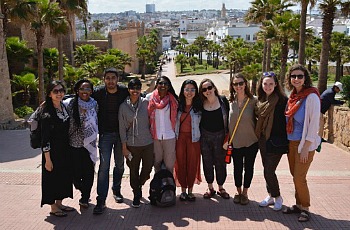Peter Mascher: “McMaster must aspire to make a difference in a positive way”

Peter Mascher, Associate Vice-President, International, recently released The McMaster Model for Global Engagement: A Strategy Document which outlines several key principles and strategic elements intended to guide the development of international activities at McMaster.
Learn more about the The McMaster Model for Global Engagement: A Strategy Document
Mascher sat down with the Daily News to talk about this new document and to expand on what global engagement means at McMaster.
Why do you think global engagement is such a critical part of a university education?
We firmly believe that educated young people need to have a worldview that goes beyond Ontario or Canada– they have to have an understanding of what it means to be a global citizen.
This strategy document is about creating the conditions for this to happen– it’s about asking ourselves how we can create an environment in which global engagement is embedded in the normal activities of the university and becomes an integral part of what we do, so there’s always a global component to our research, our teaching and learning, and the student experience.
How is McMaster’s approach unique?
We are one of the world’s top research universities and there is a demand internationally for our expertise in research and education– students from around the world study here and international institutions collaborate with our researchers and faculty members. For many universities that’s what internationalization is mainly about – mobility – coming and going.
For McMaster, global engagement goes beyond moving people around, nor is it limited to bringing in the largest number of international students and generating the largest possible revenue stream. We want to educate people that can contribute to making a difference in the world, to instil a sense of social awareness that can help our students understand global challenges, and develop research and academic partnerships that are guided by a sense of integrity and that bring mutual benefit. That’s what a top level university must aspire to- making a difference in a positive way.
What does global awareness bring to the student experience?
There is so much opportunity for intercultural exchange on our campus. Our international students carry with them diverse traditions, beliefs, and cultures. There are also many domestic students with roots abroad who bring their own unique perspectives to McMaster. Any conversation between peers in their cohort may lead to a conversation about beliefs, cultures or backgrounds that are different and people need to be open to these conversations.
Understanding other cultures and perspectives is not only personally enriching, but also important professionally as many of our graduates will have careers with some international component to them, whether in academia, the financial sector, businesses, the tech sector, engineering– it’s important to give students the opportunity to be exposed to international perspectives.
What opportunities does this strategy document represent for students, faculty and staff?
McMaster already has a significant international footprint– we engage with many different countries and many different universities. Many of our researchers, professors, students and alumni have spent time abroad and can share their experiences with those who may be thinking about working, or going abroad, but are hesitant for any number of reasons.

Over the next year, the Office of International Affairs, along with the Faculties will be hosting a series of workshops to provide a forum for information exchange and to hear from people who have been engaged internationally. We hope that his kind of dialogue will help create a next level of interest and lead to more participation in international activities.
For example, I was very impressed with an initiative led by Ellen Amster, the Jason A. Hannah Chair in the History of Medicine, who just recently organized an Interdisciplinary Global Health Field Course on Maternal and Infant Health in Morocco. I would love to have these students involved in the workshops to talk about their experiences.
What do you hope people will take away from this document?
I hope it serves as an inspiration to people and as a reference – it is meant to create a framework, a new mindset in which we can operate and to ensure that we’re not engaging in an initiative just because it seems opportune at the time, but because it’s consistent with the broader principles that have been established.
I know not everyone will engage internationally, but if this vision resonates with staff, students and faculty, it will impact the way they think about international engagement. I hope it helps people look at their work through an international lens and see where, in their studies, teaching, or research, they might engage globally or incorporate global perspectives.
And, as we consider future global engagement initiatives or partnerships, this document should provide the means to gauge whether this new activity meets the expectations from an ethical and aspirational perspective.
What are the next steps?
This document is not a strategy document in the traditional sense – it doesn’t contain specific goals or timelines and that was deliberate. Over the next year, we will consult with the deans, students, staff, and faculty to create an implementation plan that contains concrete steps for moving forward.
Read The McMaster Model for Global Engagement: A Strategy Document:


